湖北省宜昌市一中2015-2016学年高二下学期二月月考英语试题
- 格式:doc
- 大小:79.00 KB
- 文档页数:15
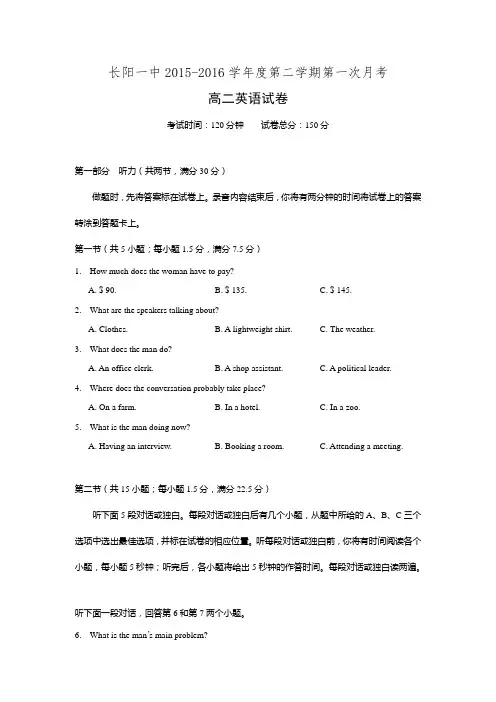
长阳一中2015-2016学年度第二学期第一次月考高二英语试卷考试时间:120分钟试卷总分:150分第一部分听力(共两节,满分30分)做题时,先将答案标在试卷上。
录音内容结束后,你将有两分钟的时间将试卷上的答案转涂到答题卡上。
第一节(共5小题;每小题1.5分,满分7.5分)1.How much does the woman have to pay?A. $ 90.B. $ 135.C. $ 145.2.What are the speakers talking about?A. Clothes.B. A lightweight shirt.C. The weather.3.What does the man do?A. An office clerk.B. A shop assistant.C. A political leader.4.Where does the conversation probably take place?A. On a farm.B. In a hotel.C. In a zoo.5.What is the man doing now?A. Having an interview.B. Booking a room.C. Attending a meeting.第二节(共15小题;每小题1.5分,满分22.5分)听下面5段对话或独白。
每段对话或独白后有几个小题,从题中所给的A、B、C三个选项中选出最佳选项,并标在试卷的相应位置。
听每段对话或独白前,你将有时间阅读各个小题,每小题5秒钟;听完后,各小题将给出5秒钟的作答时间。
每段对话或独白读两遍。
听下面一段对话,回答第6和第7两个小题。
6.What is the man’s main problem?A. Headaches.B. A running nose.C. A fever.7.When did the problem begin?A. Two weeks ago.B. Two months ago.C. Three months ago.听下面一段对话,回答第8至第10三个小题。
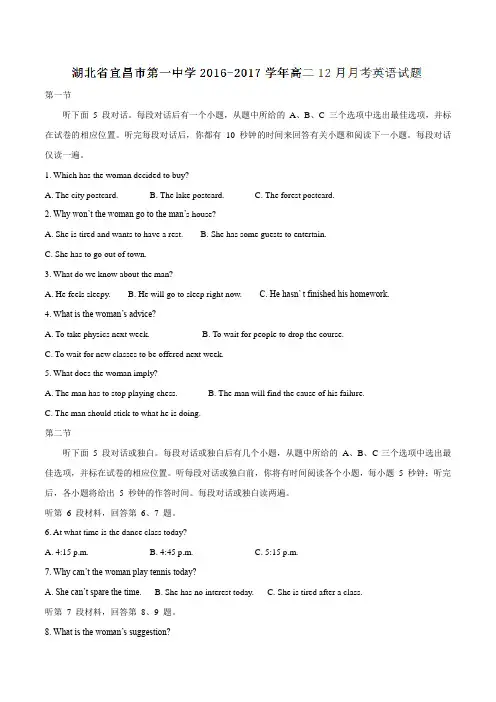
第一节听下面5 段对话。
每段对话后有一个小题,从题中所给的A、B、C 三个选项中选出最佳选项,并标在试卷的相应位置。
听完每段对话后,你都有10 秒钟的时间来回答有关小题和阅读下一小题。
每段对话仅读一遍。
1. Which has the woman decided to buy?A. The city postcard.B. The lake postcard.C. The forest postcard.2. Why won’t the woman go to the man’s house?A. She is tired and wants to have a rest.B. She has some guests to entertain.C. She has to go out of town.3. What do we know about the man?A. He feels sleepy.B. He will go to sleep right now.C. He hasn’ t finished his homework.4. W hat is the woman’s advice?A. To take physics next week.B. To wait for people to drop the course.C. To wait for new classes to be offered next week.5. What does the woman imply?A. The man has to stop playing chess.B. The man will find the cause of his failure.C. The man should stick to what he is doing.第二节听下面5 段对话或独白。
每段对话或独白后有几个小题,从题中所给的A、B、C三个选项中选出最佳选项,并标在试卷的相应位置。
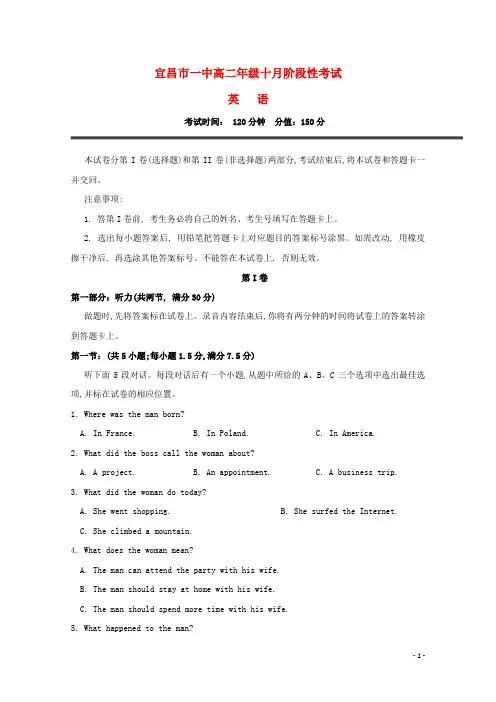
宜昌市一中高二年级十月阶段性考试英语考试时间: 120分钟分值:150分本试卷分第I卷(选择题)和第II卷(非选择题)两部分,考试结束后,将本试卷和答题卡一并交回。
注意事项:1. 答第I卷前, 考生务必将自己的姓名、考生号填写在答题卡上。
2. 选出每小题答案后, 用铅笔把答题卡上对应题目的答案标号涂黑。
如需改动, 用橡皮擦干净后, 再选涂其他答案标号。
不能答在本试卷上, 否则无效。
第I卷第一部分:听力(共两节, 满分30分)做题时,先将答案标在试卷上。
录音内容结束后,你将有两分钟的时间将试卷上的答案转涂到答题卡上。
第一节:(共5小题;每小题1.5分,满分7.5分)听下面5段对话。
每段对话后有一个小题,从题中所给的A、B、C三个选项中选出最佳选项,并标在试卷的相应位置。
1. Where was the man born?A. In France.B. In Poland.C. In America.2. What did the boss call the woman about?A. A project.B. An appointment.C. A business trip.3. What did the woman do today?A. She went shopping.B. She surfed the Internet.C. She climbed a mountain.4. What does the woman mean?A. The man can attend the party with his wife.B. The man should stay at home with his wife.C. The man should spend more time with his wife.5. What happened to the man?A. He had a car accident.B. He was stuck in the traffic.C. He stepped on some chewing gum.第二节:(共15小题;每小题1.5分,满分22.5分)听下面5段对话或独白。
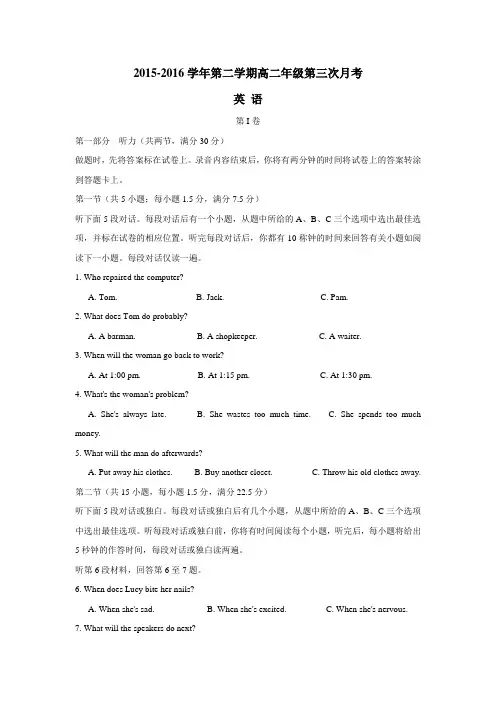
2015-2016学年第二学期高二年级第三次月考英语第I卷第一部分听力(共两节,满分30分)做题时,先将答案标在试卷上。
录音内容结束后,你将有两分钟的时间将试卷上的答案转涂到答题卡上。
第一节(共5小题;每小题1.5分,满分7.5分)听下面5段对话。
每段对话后有一个小题,从题中所给的A、B、C三个选项中选出最佳选项,并标在试卷的相应位置。
听完每段对话后,你都有10称钟的时间来回答有关小题如阅读下一小题。
每段对话仅读一遍。
1. Who repaired the computer?A. Tom.B. Jack.C. Pam.2. What does Tom do probably?A. A barman.B. A shopkeeper.C. A waiter.3. When will the woman go back to work?A. At 1:00 pm.B. At 1:15 pm.C. At 1:30 pm.4. What's the woman's problem?A. She's always late.B. She wastes too much time.C. She spends too much money.5. What will the man do afterwards?A. Put away his clothes.B. Buy another closet.C. Throw his old clothes away. 第二节(共15小题,每小题1.5分,满分22.5分)听下面5段对话或独白。
每段对话或独白后有几个小题,从题中所给的A、B、C三个选项中选出最佳选项。
听每段对话或独白前,你将有时间阅读每个小题,听完后,每小题将给出5秒钟的作答时间,每段对话或独白读两遍。
听第6段材料,回答第6至7题。
6. When does Lucy bite her nails?A. When she's sad.B. When she's excited.C. When she's nervous.7. What will the speakers do next?A. Watch a video.B. Play games.C. Visit a website.听第7段材料,回答第8至9题。
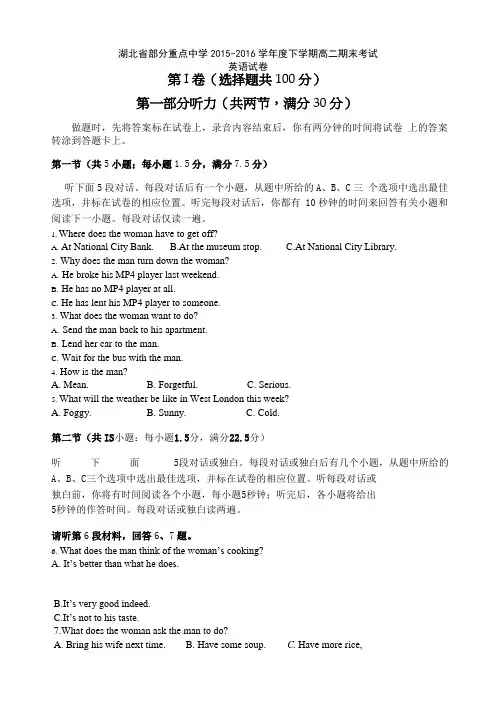
湖北省部分重点中学2015-2016学年度下学期高二期末考试英语试卷第I卷(选择题共100分)第一部分听力(共两节,满分30分)做题时,先将答案标在试卷上,录音内容结束后,你有两分钟的时间将试卷上的答案转涂到答题卡上。
第一节(共5小题;每小题1.5分,满分7.5分)听下面5段对话。
每段对话后有一个小题,从题中所给的A、B、C三个选项中选出最佳选项,并标在试卷的相应位置。
听完每段对话后,你都有 10秒钟的时间来回答有关小题和阅读下一小题。
每段对话仅读一遍。
1.Where does the woman have to get off?A.At National City Bank.B.At the museum stop.C.At National City Library.2.Why does the man turn down the woman?A.He broke his MP4 player last weekend.B.He has no MP4 player at all.C.He has lent his MP4 player to someone.3.What does the woman want to do?A.Send the man back to his apartment.B.Lend her car to the man.C.Wait for the bus with the man.4.How is the man?A. Mean.B. Forgetful.C. Serious.5.What will the weather be like in West London this week?A. Foggy.B. Sunny.C. Cold.第二节(共IS小题:每小题1.5分,满分22.5分)听下面5段对话或独白。
每段对话或独白后有几个小题,从题中所给的A、B、C三个选项中选出最佳选项,并标在试卷的相应位置。
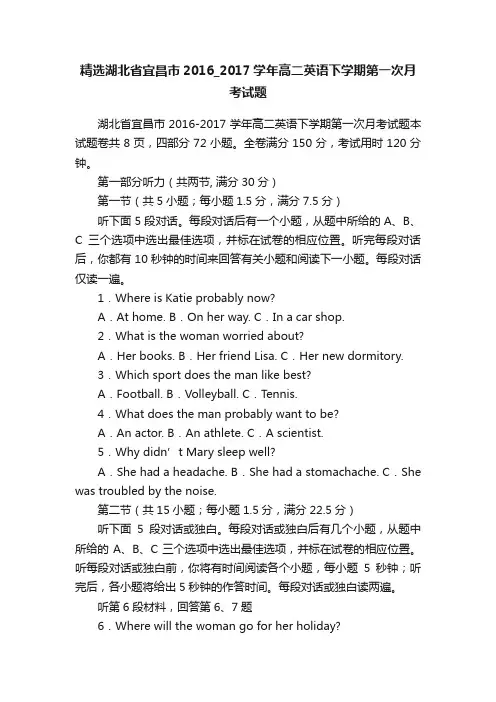
精选湖北省宜昌市2016_2017学年高二英语下学期第一次月考试题湖北省宜昌市2016-2017学年高二英语下学期第一次月考试题本试题卷共8页,四部分72小题。
全卷满分150分,考试用时120分钟。
第一部分听力(共两节, 满分30分)第一节(共5小题;每小题1.5分,满分7.5分)听下面5段对话。
每段对话后有一个小题,从题中所给的A、B、C三个选项中选出最佳选项,并标在试卷的相应位置。
听完每段对话后,你都有10秒钟的时间来回答有关小题和阅读下一小题。
每段对话仅读一遍。
1.Where is Katie probably now?A.At home. B.On her way. C.In a car shop.2.What is the woman worried about?A.Her books. B.Her friend Lisa. C.Her new dormitory.3.Which sport does the man like best?A.Football. B.Volleyball. C.Tennis.4.What does the man probably want to be?A.An actor. B.An athlete. C.A scientist.5.Why didn’t Mary sleep well?A.She had a headache. B.She had a stomachache. C.She was troubled by the noise.第二节(共15小题;每小题1.5分,满分22.5分)听下面5段对话或独白。
每段对话或独白后有几个小题,从题中所给的A、B、C三个选项中选出最佳选项,并标在试卷的相应位置。
听每段对话或独白前,你将有时间阅读各个小题,每小题5秒钟;听完后,各小题将给出5秒钟的作答时间。
每段对话或独白读两遍。
听第6段材料,回答第6、7题6.Where will the woman go for her holiday?A.Dalian. B.Lijiang. C.Dali.7.How will the woman travel there?A.By air. B.By train. C.By car.听第7段材料,回答第8、9题。
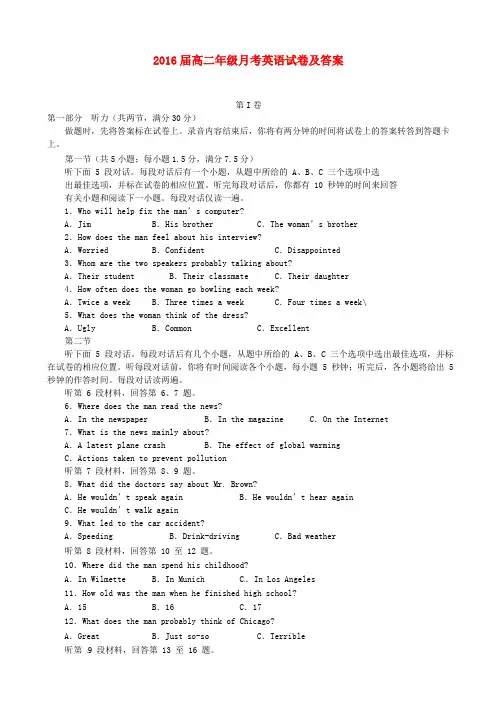
2016届高二年级月考英语试卷及答案第I卷第一部分听力(共两节,满分30分)做题时,先将答案标在试卷上。
录音内容结束后,你将有两分钟的时间将试卷上的答案转答到答题卡上。
第一节(共5小题;每小题1.5分,满分7.5分)听下面 5 段对话。
每段对话后有一个小题,从题中所给的 A、B、C 三个选项中选出最佳选项,并标在试卷的相应位置。
听完每段对话后,你都有 10 秒钟的时间来回答有关小题和阅读下一小题。
每段对话仅读一遍。
1.Who will help fix the man’s comput er?A.Jim B.His brother C.The woman’s brother2.How does the man feel about his interview?A.Worried B.Confident C.Disappointed3.Whom are the two speakers probably talking about?A.Their student B.Their classmate C.Their daughter4.How often does the woman go bowling each week?A.Twice a week B.Three times a week C.Four times a week\5.What does the woman think of the dress?A.Ugly B.Common C.Excellent第二节听下面 5 段对话。
每段对话后有几个小题,从题中所给的 A、B、C 三个选项中选出最佳选项,并标在试卷的相应位置。
听每段对话前,你将有时间阅读各个小题,每小题 5 秒钟;听完后,各小题将给出 5 秒钟的作答时间。
每段对话读两遍。
听第 6 段材料,回答第 6、7 题。
6.Where does the man read the news?A.In the newspaper B.In the magazine C.On the Internet7.What is the news mainly about?A.A latest plane crash B.The effect of global warmingC.Actions taken to prevent pollution听第 7 段材料,回答第 8、9 题。
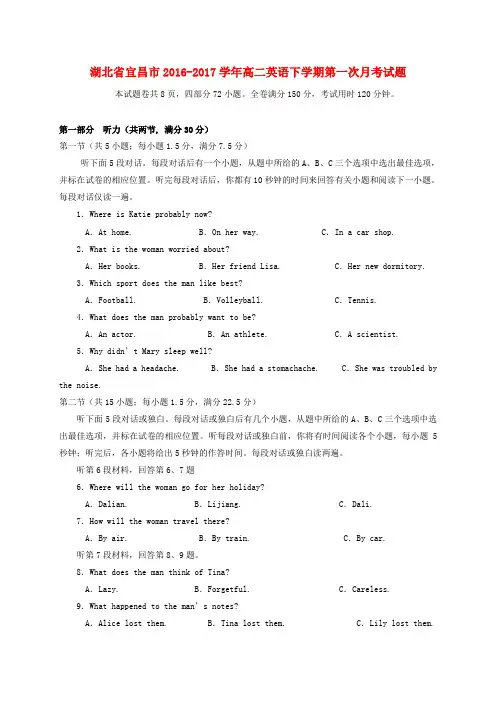
湖北省宜昌市2016-2017学年高二英语下学期第一次月考试题本试题卷共8页,四部分72小题。
全卷满分150分,考试用时120分钟。
第一部分听力(共两节, 满分30分)第一节(共5小题;每小题1.5分,满分7.5分)听下面5段对话。
每段对话后有一个小题,从题中所给的A、B、C三个选项中选出最佳选项,并标在试卷的相应位置。
听完每段对话后,你都有10秒钟的时间来回答有关小题和阅读下一小题。
每段对话仅读一遍。
1.Where is Katie probably now?A.At home. B.On her way. C.In a car shop.2.What is the woman worried about?A.Her books. B.Her friend Lisa. C.Her new dormitory.3.Which sport does the man like best?A.Football. B.Volleyball. C.Tennis.4.What does the man probably want to be?A.An actor. B.An athlete. C.A scientist.5.Why didn’t Mary sleep well?A.She had a headache. B.She had a stomachache. C.She was troubled by the noise.第二节(共15小题;每小题1.5分,满分22.5分)听下面5段对话或独白。
每段对话或独白后有几个小题,从题中所给的A、B、C三个选项中选出最佳选项,并标在试卷的相应位置。
听每段对话或独白前,你将有时间阅读各个小题,每小题5秒钟;听完后,各小题将给出5秒钟的作答时间。
每段对话或独白读两遍。
听第6段材料,回答第6、7题6.Where will the woman go for her holiday?A.Dalian. B.Lijiang. C.Dali.7.How will the woman travel there?A.By air. B.By train. C.By car.听第7段材料,回答第8、9题。
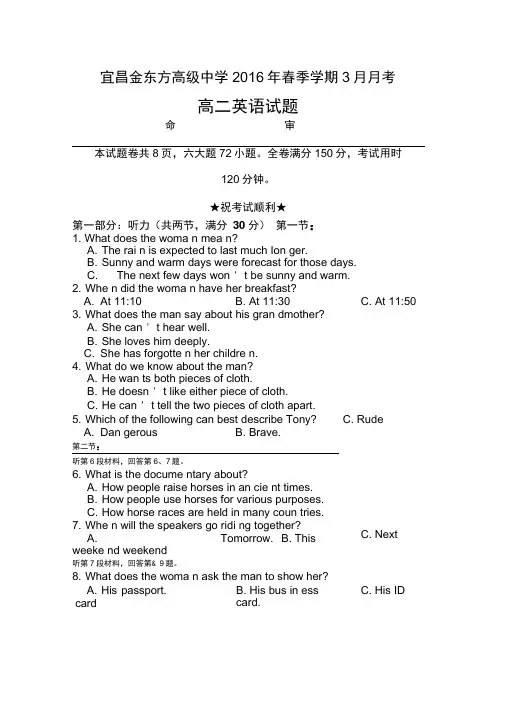
宜昌金东方高级中学2016年春季学期3月月考高二英语试题本试题卷共8页,六大题72小题。
全卷满分150分,考试用时120分钟。
★祝考试顺利★第一部分:听力(共两节,满分30分)第一节:1. What does the woma n mea n?A. The rai n is expected to last much Ion ger.B. Sunny and warm days were forecast for those days.C. The next few days won ' t be sunny and warm.2. Whe n did the woma n have her breakfast?A. At 11:10B. At 11:30C. At 11:503. What does the man say about his gran dmother?A. She can ' t hear well.B. She loves him deeply.C. She has forgotte n her childre n.4. What do we know about the man?A. He wan ts both pieces of cloth.B. He doesn ' t like either piece of cloth.C. He can ' t tell the two pieces of cloth apart.5. Which of the following can best describe Tony?A. Dan gerousB. Brave.第二节:听第6段材料,回答第6、7题。
6. What is the docume ntary about?A. How people raise horses in an cie nt times.B. How people use horses for various purposes.C. How horse races are held in many coun tries.7. Whe n will the speakers go ridi ng together?A. Tomorrow.B. Thisweeke nd weekend听第7段材料,回答第& 9题。
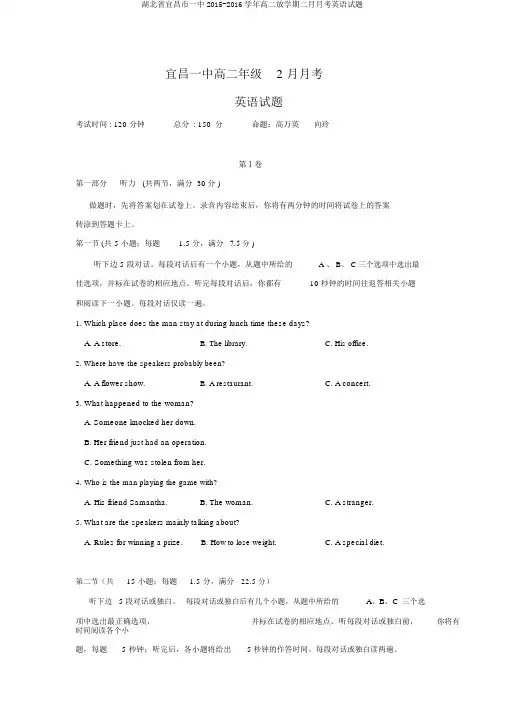
宜昌一中高二年级 2 月月考英语试题考试时间 : 120 分钟总分: 150分命题:高万英向玲第Ⅰ卷第一部分听力(共两节,满分 30分 )做题时,先将答案划在试卷上。
录音内容结束后,你将有两分钟的时间将试卷上的答案转涂到答题卡上。
第一节 (共 5 小题;每题 1.5 分,满分7.5 分 )听下边 5 段对话。
每段对话后有一个小题,从题中所给的 A 、 B、 C 三个选项中选出最佳选项,并标在试卷的相应地点。
听完每段对话后,你都有10 秒钟的时间往返答相关小题和阅读下一小题。
每段对话仅读一遍。
1. Which place does the man stay at during lunch time these days?A. A store.B. The library.C. His office.2. Where have the speakers probably been?A. A flower show.B. A restaurant.C. A concert.3.What happened to the woman?A.Someone knocked her down.B.Her friend just had an operation.C.Something was stolen from her.4.Who is the man playing the game with?A. His friend Samantha.B. The woman.C. A stranger.5. What are the speakers mainly talking about?A. Rules for winning a prize.B. How to lose weight.C. A special diet.第二节(共15 小题;每题 1.5 分,满分22.5 分)听下边 5 段对话或独白。
每段对话或独白后有几个小题,从题中所给的A、B、C三个选项中选出最正确选项,并标在试卷的相应地点。
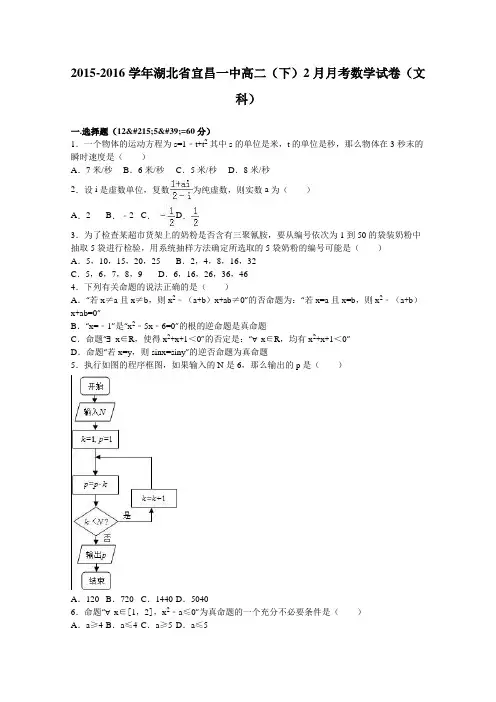
2015-2016学年湖北省宜昌一中高二(下)2月月考数学试卷(文科)一.选择题(12×5'=60分)1.一个物体的运动方程为s=1﹣t+t2其中s的单位是米,t的单位是秒,那么物体在3秒末的瞬时速度是()A.7米/秒B.6米/秒C.5米/秒D.8米/秒2.设i是虚数单位,复数为纯虚数,则实数a为()A.2 B.﹣2 C. D.3.为了检查某超市货架上的奶粉是否含有三聚氰胺,要从编号依次为1到50的袋装奶粉中抽取5袋进行检验,用系统抽样方法确定所选取的5袋奶粉的编号可能是()A.5,10,15,20,25 B.2,4,8,16,32C.5,6,7,8,9 D.6,16,26,36,464.下列有关命题的说法正确的是()A.“若x≠a且x≠b,则x2﹣(a+b)x+ab≠0”的否命题为:“若x=a且x=b,则x2﹣(a+b)x+ab=0”B.“x=﹣1”是“x2﹣5x﹣6=0”的根的逆命题是真命题C.命题“∃x∈R,使得x2+x+1<0”的否定是:“∀x∈R,均有x2+x+1<0”D.命题“若x=y,则sinx=siny”的逆否命题为真命题5.执行如图的程序框图,如果输入的N是6,那么输出的p是()A.120 B.720 C.1440 D.50406.命题“∀x∈[1,2],x2﹣a≤0”为真命题的一个充分不必要条件是()A.a≥4 B.a≤4 C.a≥5 D.a≤57.用秦九韶算法求多项式f(x)=4x4+3x3+2x2+x+7的值,则f(2)的值为()A.98 B.105 C.112 D.1198.直线l过抛物线x2=2py(p>0)的焦点,且与抛物线交于A、B两点,若线段AB的长是6,AB的中点到x轴的距离是1,则此抛物线方程是()A.x2=12y B.x2=8y C.x2=6y D.x2=4y2×2列联表:A.90% B.95% C.99% D.99.9%10.已知定义在R上的函数y=f(x)的导函数为f′(x),满足f′(x)<f(x),且f(0)=1,则不等式f(x)<e x的解集为()A.(﹣∞,e4)B.(e4,+∞)C.(﹣∞,0)D.(0,+∞)11.若f(x)=x3+ax2+bx+c有两个极值点x1,x2且f(x1)=x1,则关于x的方程3[(f(x)]2+2af (x)+b=0的不同实根个数为()A.2 B.3 C.4 D.不确定12.已知点P为双曲线=1(a>0,b>0)右支上一点,F1,F2分别为双曲线的左右成立,焦点,且|F1F2|=,I为三角形PF1F2的内心,若S=S+λS△则λ的值为()A.B. C.D.二.填空题(4×5'=20分)13.函数f(x)=xe x在点(1,f(1))处的切线方程是______.14.某服装商场为了了解毛衣的月销售量y(件)与月平均气温x(℃)之间的关系,随机统4由表中数据算出线性回归方程中的b≈﹣2.气象部门预测下个月的平均气温约为6℃,据此估计,该商场下个月毛衣的销售量约为______件.(参考公式:b=)15.已知P为圆M:(x+2)2+y2=4上的动点,N(2,0),线段PN的垂直平分线与直线PM 的交点为Q,点Q的轨迹方程为______.16.四个小动物换座位,开始是鼠、猴、兔、猫分别坐1、2、3、4号位上(如图),第一次前后排互换座位,第二次左右动物互换座位,…这样交替进行下去,那么202次互换座位后,小猴坐在第______号座位上.三.解答题17.某校对高二年段的男生进行体检,现将高二男生的体重(kg)数据进行整理后分成6组,并绘制部分频率分布直方图(如图所示).已知第三组[60,65)的人数为200.根据一般标准,高二男生体重超过65kg属于偏胖,低于55kg属于偏瘦.观察图形的信息,回答下列问题:(1)求体重在[60,65)内的频率,并补全频率分布直方图;(2)用分层抽样的方法从偏胖的学生中抽取6人对日常生活习惯及体育锻炼进行调查,则各组应分别抽取多少人?(3)根据频率分布直方图,估计高二男生的体重的中位数与平均数.18.在直角坐标系xOy中,以坐标原点O为圆心的圆与直线:相切.(1)求圆O的方程;(2)若圆O上有两点M、N关于直线x+2y=0对称,且,求直线MN 的方程.19.已知命题p:“函数f(x)=x3﹣(4m﹣1)x2+(15m2﹣2m﹣7)x+2在(﹣∞,+∞)上是增函数”,命题q:“曲线表示椭圆”,若“¬p∨¬q”是假命题,求m的取值范围.20.已知双曲线C:﹣=1(a>0,b>0).(1)有一枚质地均匀的正四面体玩具,玩具的各个面上分别写着数字1,2,3,4.若先后两次投掷玩具,将朝下的面上的数字依次记为a,b,求双曲线C的离心率小于的概率;(2)在区间[1,6]内取两个数依次记为a,b,求双曲线C的离心率小于的概率.21.已知椭圆=1(a>0,b>0)的离心率为,两焦点之间的距离为4.(Ⅰ)求椭圆的标准方程;(Ⅱ)过椭圆的右顶点作直线交抛物线y2=4x于A、B两点,(1)求证:OA⊥OB;(2)设OA、OB分别与椭圆相交于点D、E,过原点O作直线DE的垂线OM,垂足为M,证明|OM|为定值.22.已知函数f(x)=x﹣alnx,g(x)=﹣,(a∈R).(Ⅰ)若a=1,求函数f(x)的极值;(Ⅱ)设函数h(x)=f(x)﹣g(x),求函数h(x)的单调区间;(Ⅲ)若在[1,e](e=2.718…)上存在一点x0,使得f(x0)<g(x0)成立,求a的取值范围.2015-2016学年湖北省宜昌一中高二(下)2月月考数学试卷(文科)参考答案与试题解析一.选择题(12×5'=60分)1.一个物体的运动方程为s=1﹣t+t2其中s的单位是米,t的单位是秒,那么物体在3秒末的瞬时速度是()A.7米/秒B.6米/秒C.5米/秒D.8米/秒【考点】导数的几何意义.【分析】①求出s的导函数s'(t)=2t﹣1②求出s'(3)【解答】解:s'(t)=2t﹣1,s'(3)=2×3﹣1=5.故答案为C2.设i是虚数单位,复数为纯虚数,则实数a为()A.2 B.﹣2 C. D.【考点】复数代数形式的混合运算.【分析】复数的分子、分母同乘分母的共轭复数,化简后它的实部为0,可求实数a的值.【解答】解:复数==,它是纯虚数,所以a=2,故选A3.为了检查某超市货架上的奶粉是否含有三聚氰胺,要从编号依次为1到50的袋装奶粉中抽取5袋进行检验,用系统抽样方法确定所选取的5袋奶粉的编号可能是()A.5,10,15,20,25 B.2,4,8,16,32C.5,6,7,8,9 D.6,16,26,36,46【考点】系统抽样方法.【分析】利用系统抽样的性质求解.【解答】解:∵要从编号依次为1到50的袋装奶粉中抽取5袋进行检验,用系统抽样方法确定所选取的5袋奶粉的编号,∴所选取的5袋奶粉的编号应该分别在1~10,11~20,21~30,30~40,41~50中各一袋,且所选取的5袋奶粉的编号间隔相等,由此能排除A、B、C,用系统抽样方法确定所选取的5袋奶粉的编号可能是D.故选:D.4.下列有关命题的说法正确的是()A.“若x≠a且x≠b,则x2﹣(a+b)x+ab≠0”的否命题为:“若x=a且x=b,则x2﹣(a+b)x+ab=0”B.“x=﹣1”是“x2﹣5x﹣6=0”的根的逆命题是真命题C.命题“∃x∈R,使得x2+x+1<0”的否定是:“∀x∈R,均有x2+x+1<0”D.命题“若x=y,则sinx=siny”的逆否命题为真命题【考点】四种命题.【分析】一一判断即可得出结论.【解答】解:命题“若x≠a且x≠b,则x2﹣(a+b)x+ab≠0”的否命题是:若x=a或x=b,则x2﹣(a+b)x+ab=0,故A错误;x=﹣1”是“x2﹣5x﹣6=0”的根的逆命题是:x2﹣5x﹣6=0的根是x=﹣1,是假命题,故B错误;命题“∃x∈R使x2+x+1<0”是特称命题,其否定命题为:∀x∈R,使x2+x+1≥0,故C错误;命题“若x=y,则sinx=siny”的逆否命题为命题“若sinx≠siny”,则“x≠y”,正确;故选:D.5.执行如图的程序框图,如果输入的N是6,那么输出的p是()A.120 B.720 C.1440 D.5040【考点】程序框图.【分析】执行程序框图,写出每次循环p,k的值,当k<N不成立时输出p的值即可.【解答】解:执行程序框图,有N=6,k=1,p=1P=1,k<N成立,有k=2P=2,k<N成立,有k=3P=6,k<N成立,有k=4P=24,k<N成立,有k=5P=120,k<N成立,有k=6P=720,k<N不成立,输出p的值为720.故选:B.6.命题“∀x∈[1,2],x2﹣a≤0”为真命题的一个充分不必要条件是()A.a≥4 B.a≤4 C.a≥5 D.a≤5【考点】命题的真假判断与应用.【分析】本题先要找出命题为真命题的充要条件{a|a≥4},从集合的角度充分不必要条件应为{a|a≥4}的真子集,由选择项不难得出答案.【解答】解:命题“∀x∈[1,2],x2﹣a≤0”为真命题,可化为∀x∈[1,2],a≥x2,恒成立即只需a≥(x2)max=4,即“∀x∈[1,2],x2﹣a≤0”为真命题的充要条件为a≥4,而要找的一个充分不必要条件即为集合{a|a≥4}的真子集,由选择项可知C符合题意.故选C7.用秦九韶算法求多项式f(x)=4x4+3x3+2x2+x+7的值,则f(2)的值为()A.98 B.105 C.112 D.119【考点】秦九韶算法.【分析】f(x)=4x4+3x3+2x2+x+7=(((4x+3)x+2)x+1)x+7,即可得出.【解答】解:f(x)=4x4+3x3+2x2+x+7=(((4x+3)x+2)x+1)x+7,∴f(2)=(((4×2+3)×2+2)×2+1)×2+7=105,故选:B.8.直线l过抛物线x2=2py(p>0)的焦点,且与抛物线交于A、B两点,若线段AB的长是6,AB的中点到x轴的距离是1,则此抛物线方程是()A.x2=12y B.x2=8y C.x2=6y D.x2=4y【考点】抛物线的简单性质.【分析】设A(x1,y1),B(x2,y2),由题意得到x1+x2=2,x1+x2+p=6,由此能求出此抛物线方程.【解答】解:设A(x1,y1),B(x2,y2),∵直线l过抛物线x2=2py(p>0)的焦点,且与抛物线交于A、B两点,AB的中点到x轴的距离是1,∴x1+x2=2,∵线段AB的长是6,∴x1+x2+p=6,解得p=2,∴此抛物线方程是x2=4y.故选:D.2×2列联表:A.90% B.95% C.99% D.99.9%【考点】独立性检验的应用.【分析】计算观测值,与临界值比较,即可得出结论.【解答】解:设H0:饮食习惯与年龄无关.因为Χ2==10>6.635,所以有99%的把握认为其亲属的饮食习惯与年龄有关.故选:C.10.已知定义在R上的函数y=f(x)的导函数为f′(x),满足f′(x)<f(x),且f(0)=1,则不等式f(x)<e x的解集为()A.(﹣∞,e4)B.(e4,+∞)C.(﹣∞,0)D.(0,+∞)【考点】导数的运算.【分析】构造函数g(x)=(x∈R),研究g(x)的单调性,结合原函数的性质和函数值,即可求解.【解答】解:设g(x)=(x∈R),则g′(x)=,∵f′(x)<f(x),∴f′(x)﹣f(x)<0∴g′(x)<0,∴y=g(x)在定义域上单调递减∵f(x)<e x∴g(x)<1又∵g(0)==1∴g(x)<g(0)∴x>0故选:D.11.若f(x)=x3+ax2+bx+c有两个极值点x1,x2且f(x1)=x1,则关于x的方程3[(f(x)]2+2af (x)+b=0的不同实根个数为()A.2 B.3 C.4 D.不确定【考点】利用导数研究函数的极值.【分析】由函数f(x)=x3+ax2+bx+c有两个极值点x1,x2,可得f′(x)=3x2+2ax+b=0有两个不相等的实数根,必有△=4a2﹣12b>0.而方程3(f(x))2+2af(x)+b=0的△1=△>0,可知此方程有两解且f(x)=x1或x2.再分别讨论利用平移变换即可解出方程f(x)=x1或f(x)=x2解得个数.【解答】解:∵函数f(x)=x3+ax2+bx+c有两个极值点x1,x2,不妨设x1<x2,∴f′(x)=3x2+2ax+b=0有两个不相等的实数根,∴△=4a2﹣12b>0.解得x=.∵x1<x2,∴x1=,x2=.而方程3(f (x ))2+2af (x )+b=0的△1=△>0,∴此方程有两解且f (x )=x 1或x 2.不妨取0<x 1<x 2,f (x 1)>0.①把y=f (x )向下平移x 1个单位即可得到y=f (x )﹣x 1的图象,∵f (x 1)=x 1,可知方程f (x )=x 1有两解.②把y=f (x )向下平移x 2个单位即可得到y=f (x )﹣x 2的图象,∵f (x 1)=x 1,∴f (x 1)﹣x 2<0,可知方程f (x )=x 2只有一解.综上①②可知:方程f (x )=x 1或f (x )=x 2.只有3个实数解.即关于x 的方程3(f (x ))2+2af (x )+b=0的只有3不同实根.故选:B .12.已知点P 为双曲线=1(a >0,b >0)右支上一点,F 1,F 2分别为双曲线的左右焦点,且|F 1F 2|=,I 为三角形PF 1F 2的内心,若S =S +λS △成立,则λ的值为( )A .B .C .D .【考点】双曲线的简单性质.【分析】设△PF 1F 2的内切圆半径为r ,由|PF 1|﹣|PF 2|=2a ,|F 1F 2|=2c ,用△PF 1F 2的边长和r 表示出等式中的三角形的面积,解此等式求出λ.【解答】解:设△PF 1F 2的内切圆半径为r ,由双曲线的定义得|PF 1|﹣|PF 2|=2a ,|F 1F 2|=2c ,S △IPF1 =|PF 1|•r ,S △IPF2=|PF 2|•r ,S △IF1F2=•2c •r=cr ,由题意得: |PF1|•r=|PF2|•r+λcr,故λ==,∵|F1F2|=,∴=∴∴=故选D.二.填空题(4×5'=20分)13.函数f(x)=xe x在点(1,f(1))处的切线方程是y=2ex﹣e.【考点】利用导数研究曲线上某点切线方程.【分析】求出函数的导数,求得切线的斜率和切点,由点斜式方程即可得到切线方程.【解答】解:函数f(x)=xe x的导数为f′(x)=e x+xe x,在点(1,f(1))处的切线斜率为k=2e,切点为(1,e),则有在点(1,f(1))处的切线方程为y﹣e=2e(x﹣1),即为y=2ex﹣e.故答案为:y=2ex﹣e.14.某服装商场为了了解毛衣的月销售量y(件)与月平均气温x(℃)之间的关系,随机统4由表中数据算出线性回归方程中的b≈﹣2.气象部门预测下个月的平均气温约为6℃,据此估计,该商场下个月毛衣的销售量约为46件.(参考公式:b=)【考点】线性回归方程.【分析】根据所给的表格做出本组数据的样本中心点,根据样本中心点在线性回归直线上,利用待定系数法做出a的值,可得线性回归方程,根据所给的x的值,代入线性回归方程,预报要销售的件数.【解答】解:由表格得(,)为:(10,38),又(,)在回归方程y=bx+a中的b=﹣2,∴38=10×(﹣2)+a,解得:a=58,∴y=﹣2x+58,当x=6时,y=﹣2×6+58=46.故答案为:46.15.已知P为圆M:(x+2)2+y2=4上的动点,N(2,0),线段PN的垂直平分线与直线PM的交点为Q,点Q的轨迹方程为x2﹣=1.【考点】轨迹方程.【分析】由中垂线的性质可知|QN|=|PQ|,故而||QN|﹣|QM||=||PQ|﹣|QM||=|PM|=2,所以Q的轨迹为以M,N为焦点的双曲线.【解答】解:∵Q在PN的中垂线上,∴|QN|=|PQ|,∴||QN|﹣|QM||=||PQ|﹣|QM||=|PM|=2,∴Q的轨迹为以M,N为焦点的双曲线.设双曲线方程为,则,又∵a2+b2=c2,∴a2=1,b2=3,∴点Q的轨迹方程为x2﹣=1.故答案为x2﹣=1.16.四个小动物换座位,开始是鼠、猴、兔、猫分别坐1、2、3、4号位上(如图),第一次前后排互换座位,第二次左右动物互换座位,…这样交替进行下去,那么202次互换座位后,小猴坐在第4号座位上.【考点】归纳推理.【分析】观察不难发现,经过四次变换后又回到原位,用202除以4,根据余数的情况解答即可.【解答】解:由图可知,经过四次交换后,每个小动物又回到了原来的位置,故此变换的规律是周期为4,∵202÷4=50…2,∴第202次互换座位后,与第2次的座位相同,小猴的座位号为4.故答案为:4.三.解答题17.某校对高二年段的男生进行体检,现将高二男生的体重(kg)数据进行整理后分成6组,并绘制部分频率分布直方图(如图所示).已知第三组[60,65)的人数为200.根据一般标准,高二男生体重超过65kg属于偏胖,低于55kg属于偏瘦.观察图形的信息,回答下列问题:(1)求体重在[60,65)内的频率,并补全频率分布直方图;(2)用分层抽样的方法从偏胖的学生中抽取6人对日常生活习惯及体育锻炼进行调查,则各组应分别抽取多少人?(3)根据频率分布直方图,估计高二男生的体重的中位数与平均数.【考点】众数、中位数、平均数;分层抽样方法;频率分布直方图.【分析】(1)利用频率分布直方图的性质能求出求出体重在[60,65)内的频率,由此能补全的频率分布直方图.(2)设男生总人数为n,由,可得n=1000,从而体重超过65kg的总人数300,由此能求出各组应分别抽取的人数.(3)利用频率分布直方图能估计高二男生的体重的中位数与平均数.【解答】解:(1)体重在[60,65)内的频率=1﹣(0.03+0.07+0.03+0.02+0.01)×5=0.2=,补全的频率分布直方图如图所示.…(2)设男生总人数为n,由,可得n=1000体重超过65kg的总人数为(0.03+0.02+0.01)×5×1000=300在[65,70)的人数为0.03×5×1000=150,应抽取的人数为,在[65,70)的人数为0.02×5×1000=100,应抽取的人数为,在[75,80)的人数为0.01×5×1000=50,应抽取的人数为.所以在[65,70),[70,75),[75,80]三段人数分别为3,2,1.…(3)中位数为60kg平均数为(52.5×0.03+57.5×0.07+62.5×0.04+67.5×0.03+72.5×0.02+77.5×0.01)×5=61.75(kg)…18.在直角坐标系xOy中,以坐标原点O为圆心的圆与直线:相切.(1)求圆O的方程;(2)若圆O上有两点M、N关于直线x+2y=0对称,且,求直线MN的方程.【考点】圆的标准方程;关于点、直线对称的圆的方程.【分析】(Ⅰ)设圆O的半径为r,由圆心为原点(0,0),根据已知直线与圆O相切,得到圆心到直线的距离d=r,利用点到直线的距离公式求出圆心O到已知直线的距离d,即为圆的半径r,由圆心和半径写出圆O的标准方程即可;(Ⅱ)设出直线方程,利用点到直线的距离以及垂径定理求出直线方程中的参数,即可得到直线方程.【解答】(本题满分14分)(1)依题设,圆O的半径r等于原点O到直线的距离,即.…得圆O的方程为x2+y2=4.…(2)由题意,可设直线MN的方程为2x﹣y+m=0.…则圆心O到直线MN的距离.…由垂径分弦定理得:,即.…所以直线MN的方程为:或.…19.已知命题p:“函数f(x)=x3﹣(4m﹣1)x2+(15m2﹣2m﹣7)x+2在(﹣∞,+∞)上是增函数”,命题q:“曲线表示椭圆”,若“¬p∨¬q”是假命题,求m的取值范围.【考点】复合命题的真假.【分析】分别求出关于p,q成立的m的范围,根据“¬p∨¬q”是假命题,得到“p∧q”是真命题,求出m的范围即可.【解答】解:若关于命题p:“函数f(x)=x3﹣(4m﹣1)x2+(15m2﹣2m﹣7)x+2在(﹣∞,+∞)上是增函数”,为真命题;对f(x)=x3﹣(4m﹣1)x2+(15m2﹣2m﹣7)x+2求导,得:f′(x)=x2﹣2(4m﹣1)x+(15m2﹣2m﹣7),已知函数f(x)=x3﹣(4m﹣1)x2+(15m2﹣2m﹣7)x+2在(﹣∞,+∞)上是增函数,故f′(x)≥0,即求使x2﹣2(4m﹣1)x+(15m2﹣2m﹣7)≥0的m的取值范围,可以看出函数开口向上,使△≤0即可,对[﹣2(4m﹣1)]2﹣4(15m2﹣2m﹣7)≤0求解,得:2≤m≤4.若关于命题q:“曲线表示椭圆”,为真命题;则,解得:﹣1<m<5,且m≠2,由题意知,命题“¬p∨¬q”为假,其否定为“p∧q”,是真命题.所以由,解得:m∈(2,4].可得:实数m的取值范围是:(2,4].20.已知双曲线C:﹣=1(a>0,b>0).(1)有一枚质地均匀的正四面体玩具,玩具的各个面上分别写着数字1,2,3,4.若先后两次投掷玩具,将朝下的面上的数字依次记为a,b,求双曲线C的离心率小于的概率;(2)在区间[1,6]内取两个数依次记为a,b,求双曲线C的离心率小于的概率.【考点】列举法计算基本事件数及事件发生的概率;几何概型.【分析】(1)由双曲线C的离心率小于,得到0<b<2a,由此列举法能求出双曲线C的离心率小于的概率.(2)由a∈[1,6],b∈[1,6],以a为横轴,以b为纵轴建立直角坐标系,由几何概型能求出双曲线C的离心率小于的概率.【解答】解:(1)双曲线的离心率.因为∴.…因玩具枚质地是均匀的,各面朝下的可能性相等,所以基本事件(a,b)共有16个:(1,1),(1,2),(1,3),(1,4),(2,1),(2,2),(2,3),(2,4),(3,1),(3,2),(3,3),(3,4),(4,1),(4,2),(4,3),(4,4).设“双曲线C的离心率小于”为事件A,则事件A所包含的基本事件为:(1,1),(2,1),(2,2),(2,3),(3,1),(3,2),(3,3),(3,4),(4,1),(4,2),(4,3),(4,4)共有12个.故双曲线C的离心率小于的概率为.…(2)∵a∈[1,6],b∈[1,6]∴所以以a为横轴,以b为纵轴建立直角坐标系,如图所示,==21,S阴影由几何概型可知,双曲线C的离心率小于的概率为.…21.已知椭圆=1(a>0,b>0)的离心率为,两焦点之间的距离为4.(Ⅰ)求椭圆的标准方程;(Ⅱ)过椭圆的右顶点作直线交抛物线y2=4x于A、B两点,(1)求证:OA⊥OB;(2)设OA、OB分别与椭圆相交于点D、E,过原点O作直线DE的垂线OM,垂足为M,证明|OM|为定值.【考点】直线与圆锥曲线的综合问题;椭圆的标准方程.【分析】(I)利用椭圆的离心率为,两焦点之间的距离为4,即可确定椭圆的标准方程;(Ⅱ)(1)设过椭圆的右顶点(4,0)的直线AB的方程为x=my+4,代入抛物线方程y2=4x,得y2﹣4my﹣16=0.设A(x1,y1)、B(x2,y2),再验证x1x2+y1y2=0即可;(2)设D(x3,y3)、E(x4,y4),直线DE的方程为x=ty+λ,代入,得(3t2+4)y2+6tλy+3λ2﹣48=0.根据OD⊥OE,可得x3x4+y3y4=0,从而可得7λ2=48(t2+1),即可计算原点到直线DE的距离为定值.【解答】解:(Ⅰ)由得,故b2=a2﹣c2=12.所以,所求椭圆的标准方程为.(Ⅱ)(1)设过椭圆的右顶点(4,0)的直线AB的方程为x=my+4.代入抛物线方程y2=4x,得y2﹣4my﹣16=0.设A(x1,y1)、B(x2,y2),则∴x1x2+y1y2=(my1+4)(my2+4)+y1y2=(1+m2)y1y2+4m(y1+y2)+16=0.∴OA⊥OB.(2)设D(x3,y3)、E(x4,y4),直线DE的方程为x=ty+λ,代入,得(3t2+4)y2+6tλy+3λ2﹣48=0.于是.从而∵OD⊥OE,∴x3x4+y3y4=0.代入,整理得7λ2=48(t2+1).∴原点到直线DE的距离d=为定值.22.已知函数f(x)=x﹣alnx,g(x)=﹣,(a∈R).(Ⅰ)若a=1,求函数f(x)的极值;(Ⅱ)设函数h(x)=f(x)﹣g(x),求函数h(x)的单调区间;(Ⅲ)若在[1,e](e=2.718…)上存在一点x0,使得f(x0)<g(x0)成立,求a的取值范围.【考点】利用导数研究函数的极值;利用导数研究函数的单调性;利用导数求闭区间上函数的最值.【分析】(Ⅰ)先求出其导函数,让其大于0求出增区间,小于0求出减区间即可得到函数的单调区间进而求出函数f(x)的极值;(Ⅱ)先求出函数h(x)的导函数,分情况讨论让其大于0求出增区间,小于0求出减区间即可得到函数的单调区间;(Ⅲ)先把f(x0)<g(x0)成立转化为h(x0)<0,即函数在[1,e]上的最小值小于零;再结合(Ⅱ)的结论分情况讨论求出其最小值即可求出a的取值范围.【解答】解:(Ⅰ)f(x)的定义域为(0,+∞),当a=1时,f(x)=x﹣lnx,,所以f(x)在x=1处取得极小值1.(Ⅱ),①当a+1>0时,即a>﹣1时,在(0,1+a)上h'(x)<0,在(1+a,+∞)上h'(x)>0,所以h(x)在(0,1+a)上单调递减,在(1+a,+∞)上单调递增;②当1+a≤0,即a≤﹣1时,在(0,+∞)上h'(x)>0,所以,函数h(x)在(0,+∞)上单调递增.(III)在[1,e]上存在一点x0,使得f(x0)<g(x0)成立,即在[1,e]上存在一点x0,使得h(x0)<0,即函数在[1,e]上的最大值小于零.由(Ⅱ)可知①即1+a≥e,即a≥e﹣1时,h(x)在[1,e]上单调递增,所以h(x)的最小值为h(e),由可得,因为,所以;②当1+a≤1,即a≤0时,h(x)在[1,e]上单调递增,所以h(x)最小值为h(1),由h(1)=1+1+a<0可得a<﹣2;③当1<1+a<e,即0<a<e﹣1时,可得h(x)最小值为h(1+a),因为0<ln(1+a)<1,所以,0<aln(1+a)<a故h(1+a)=2+a﹣aln(1+a)>2此时,h(1+a)<0不成立.综上讨论可得所求a的范围是:或a<﹣2.2016年10月5日。
【关键字】学期宜昌市一中2017年春季学期高二年级3月阶段检测试题英语本试卷分第Ⅰ卷(选择题)和第Ⅱ卷(非选择题)两部分。
本试卷共150分,考试用时120分钟。
★祝考试顺利★第一部分:听力(共两节,满分30分)第一节(共5小题;每小题1.5分,满分7.5分)听下面5段对话。
每段对话后有一个小题,从题中所给的A、B、C三个选项中选出最佳选项,并标在试卷的相应位置。
听完每段对话后,你都有10秒钟的时间来回答有关小题和阅读下一小题。
每段对话仅读一遍。
1. What kind of music does the woman like?A. Classical music.B. Rock music.C. Country music.2. What does the woman want to buy?A. Sweets and apples.B. Oranges and apples.C. Vegetables and apples.3. What does the man mean?A. He had a good time at the party.B. He doesn't want to see his friends again.C. He didn't enjoy the party at all.4. What does the woman suggest the man do?A. Go on a diet.B. Talk to her sister.C. Introduce himself first.5. What will the man probably do tonight?A. Read Chapter 4.B. Study in the library.C. Watch the football match.第二节(共15小题;每小题1.5分,满分22.5分)听下面5段对话或独白。
湖北省部分重点中学2015-2016学年度下学期高二期末考试英语试卷第I卷(选择题共100分)第一部分听力(共两节,满分30分)做题时,先将答案标在试卷上,录音内容结束后,你有两分钟的时间将试卷上的答案转涂到答题卡上。
第一节(共5小题;每小题1.5分,满分7.5分)听下面5段对话。
每段对话后有一个小题,从题中所给的A、B、C三个选项中选出最佳选项,并标在试卷的相应位置。
听完每段对话后,你都有 10秒钟的时间来回答有关小题和阅读下一小题。
每段对话仅读一遍。
1.Where does the woman have to get off?A.At National City Bank.B.At the museum stop.C.At National City Library.2.Why does the man turn down the woman?A.He broke his MP4 player last weekend.B.He has no MP4 player at all.C.He has lent his MP4 player to someone.3.What does the woman want to do?A.Send the man back to his apartment.B.Lend her car to the man.C.Wait for the bus with the man.4.How is the man?A. Mean.B. Forgetful.C. Serious.5.What will the weather be like in West London this week?A. Foggy.B. Sunny.C. Cold.第二节(共IS小题:每小题1.5分,满分22.5分)听下面5段对话或独白。
每段对话或独白后有几个小题,从题中所给的A、B、C三个选项中选出最佳选项,并标在试卷的相应位置。
湖北宜昌市第一中学2014-2015学年高二3月月考英语试题————————————————————————————————作者:————————————————————————————————日期:湖北宜昌市第一中学2014-2015学年高二3月月考英语试题1. Why does the woman arrive late for work?A. She was caught in a traffic jam.B. Her car wasn't working well.C. She can't ride a bike fast.2. What will the man do this evening?A. Eat out.B. Meet the woman.C. Attend a meeting.3. What did the woman help the man do yesterday?A. Give a presentation.B. Meet a customer.C. Fill in a form.4. What are the speakers talking about?A. How John hurt his knee.B. When the basketball game began.C. Whether John will play in a game.5. What is the woman going to do next?A. Consult a map.B. Ask someone in Angell Hall.C. Follow the man to the headmaster's office.第二节(共15小题;每小题1.5分,满分22.5分)听下面5段对话或独白。
每段对话或独白后有几个小题,从题中所给的A、B、C三个选项中选出最佳选项,并标在试卷的相应位置。
2015—2016学年下学期高二年级第二次半月考英语试卷第1卷第一局部听力(共两节,总分为30分)第一节(共5小题;每一小题1.5分,总分为7.5分)听下面5段对话。
每段对话后有一个小题,从题中所给的A、B、C三个选项中选出最优选项,并标在试卷的相应位置。
听完每段对话后,你都有10秒钟的时间来回答有关小题和阅读下一小题。
每段对话仅读一遍。
1. Who repaired the computer?A. Tom.B. Jack.C. Pam.2. What does Tom do probably?A. A barman.B. A shopkeeper.C. A waiter.3. When will the woman go back to work?A. At 1:00 pm.B. At 1:15 pm.C. At 1:30 pm.4. What's the woman's problem?A. She's always late.B. She wastes too much time.C. She spends too much money.5. What will the man do afterwards?A. Put away his clothes.B. Buy another closet.C. Throw his old clothes away.第二节(共15小题;每一小题1.5分,总分为22.5分)听下面5段对话或独白。
每段对话或独白后有几个小题,从题中所给的A、B、C三个选项中选出最优选项,并标在试卷的相应位置。
听每段对话或独白前,你将有时间阅读各个小题,每一小题5秒钟;听完后,各小题给出5秒钟的作答时间。
每段对话或独白读两遍。
听下面一段对话,回答第6和第7两个小题。
6. When does Lucy bite her nails?A. When she's sad.B. When she's excited.C. When she's nervous.7. What will the speakers do next?A. Watch a video.B. Play games.C. Visit a website.听下面一段对话,回答第8和第9两个小题。
湖北省宜昌市第一中学2014-2015学年高二上学期期末考试英语试题第一部分: 听力(共两节,满分30分)做题时,先将答案划在试卷上。
录音内容结束后,你将有两分钟的时间将试卷上的答案转涂到答题卡上。
第一节(共5小题;每小题1.5分,满分7.5分)听下面5段对话。
每段对话后有一个小题,从题中所给的A、B、C三个选项中选出最佳选项,并标在试卷的相应位置。
听完每段对话后,你都有10秒钟的时间来回答有关小题和阅读下一小题。
每段对话仅读一遍。
1. What will the man probably do with the woman’s paper?A. Type it.B. Check it.C. Finish it.2. How can the woman solve the software problem according to the man?A. By changing the software.B. By buying a new computer.C. By increasing computer memory.3. What does the woman say about the movie?A. Many stars show up in it.B. It has a wonderful name.C. It is on the top list.4. What are the speakers mainly talking about?A. A house.B. Hobbies.C. A person.5. What do we know about the woman?A. She should buy tickets in advance.B. She can buy tickets down the road.C. She will take a No. 37 bus.第二节(共15小题;每小题1.5分,满分22.5分)听下面5段对话或独白。
【全国名校】2014-2015学年湖北宜昌市第一中学高二3月月考英语试卷(带解析)学校:___________姓名:___________班级:___________考号:___________I、单选题(本大题共10小题,共10.0分)1.The lower production levels are a _________ of dissatisfaction among the workers, so it’s time to raise their salary.A.symptomB.recognitionC.potentialD.tendency【答案】A【解析】试题分析:考查名词辨析。
A. symptom症状、征兆;B. recognition 承认、识别;C. potential 潜力;D. tendency倾向;句意:低产率是工人不满意的征兆,因此是时候提高他们的薪水了。
故选A考点:考查名词辨析2.A 19-year-old teenager from Guangdong nicknamed Niko demanded an apology from Youku, which he believed violated their copyrights as it used his team's photos without_________.A.appreciationB.approvalC.assistanceD.assessment【答案】B【解析】试题分析:考查名词辨析。
A. appreciation欣赏;B. approval 许可;C. assistance帮助;D. assessment评估;句意;来自广东的19岁青少年Niko要求优酷道歉,因为他认为优酷未经许可使用他的团队的照片侵犯了其著作权。
故选B 考点:考查名词辨析3.Los Angeles Times reported that researchers may have found a way to _________ human life by changing certain genes, so that humans might expect to live twice as long.A.extendB.preserveC.multiplyD.transform【答案】A【解析】试题分析:考查动词辨析。
宜昌一中高二年级2月月考英语试题考试时间: 120分钟总分: 150分命题:高万英向玲第Ⅰ卷第一部分听力(共两节,满分30分)做题时,先将答案划在试卷上。
录音内容结束后,你将有两分钟的时间将试卷上的答案转涂到答题卡上。
第一节(共5小题;每小题1.5分,满分7.5分)听下面5段对话。
每段对话后有一个小题,从题中所给的A、B、C三个选项中选出最佳选项,并标在试卷的相应位置。
听完每段对话后,你都有10秒钟的时间来回答有关小题和阅读下一小题。
每段对话仅读一遍。
1. Which place does the man stay at during lunch time these days?A. A store.B. The library.C. His office.2. Where have the speakers probably been?A. A flower show.B. A restaurant.C. A concert.3. What happened to the woman?A. Someone knocked her down.B. Her friend just had an operation.C. Something was stolen from her.4. Who is the man playing the game with?A. His friend Samantha.B. The woman.C. A stranger.5. What are the speakers mainly talking about?A. Rules for winning a prize.B. How to lose weight.C. A special diet.第二节(共15小题;每小题1.5分,满分22.5分)听下面5段对话或独白。
每段对话或独白后有几个小题,从题中所给的A、B、C三个选项中选出最佳选项,并标在试卷的相应位置。
听每段对话或独白前,你将有时间阅读各个小题,每小题5秒钟;听完后,各小题将给出5秒钟的作答时间。
每段对话或独白读两遍。
听第6段材料,回答第6、7题。
6. What does the woman hope to buy?A. A medium blue shirt.B. A medium blue bag.C. A small blue bag.7. What can we learn from the conversation?A. The man is a shop assistant.B. The woman will come back herself next week.C. The man has ordered more products the woman wants.听第7段材料,回答第8、9题。
8. Why was the woman on the news?A. She won a music contest.B. She sang a song for charity.C. She wrote a song for the TV station.9. What is her plan about singing?A. She decides to be a professional singer.B. She will stick to it whatever happens.C. She will just sing in her spare time.听第8段材料,回答第10至13题。
10. What are the speakers doing?A. Watching ads on TV.B. Reading ads in a newspaper.C. Looking for an office building.11. What products does Culture Flash sell?A. Cloths.B. Lamps.C. Books.12. What’s one of the requirements of the job offer?A. Rich experience.B. Being able to travel.C. Being independent.13. What will the man probably do later?A. Look for a different job.B. Go to the company’s office.C. Go to class.听第9段材料,回答第14至17题。
14. Where did the woman take her pictures?A. In Australia.B. In America.C. In Africa.15. How much money did the man save by buying his camera in Japan?A. $200.B. $400.C. $500.16. What mistake did the woman make?A. She didn’t save her own pictures.B. She thought the man had saved his pictures.C. She accidentally broke the man’s camera.17. How did the man sound in the end?A. Angry.B. Surprised.C. Relieved.听第10段材料,回答第18至20题。
18. What is the talk mainly about?A. Why people laugh.B. The benefits of laughing.C. Different funny things in life.19. What does the speaker suggest people do?A. Spend time with children and pets.B. Tell jokes with their funny neighbors.C. Watch funny movies a lot.20. Why should people have “full belly laughs”?A. To live longer.B. To entertain others.C. To make your belly smaller.第二部分阅读理解(共两节,满分40分)第一节(共15小题;每小题2分,满分30分)阅读下列短文,从每题所给的四个选项(A, B, C和D)中,选出最佳选项,并在答题卡上将该项涂黑。
ALong ago a Native American chief named Shenandoah lived with his tribes in what is now thestate of Virginia. Little is known about Shenandoah, but in some way, the soft sound of his name was given to a river. The Shenandoah River still flows in a deep valley between the Allegheny and Blue Ridge Mountains, just as it did when Chief Shenandoah lived. It is a slow moving river, soft and as beautiful as its name. Some word experts believe the word “Shenandoah” means “spruce river” because the waters of the river run through great forests of spruce trees. And this explanation could be correct.However, there is an old Native American story which is far more beautiful than that of the experts. Centuries before Europeans came to the New World, there was a great lake of blue water hidden in the mountains of Virginia. For hundreds of years, Native American tribes lived near this lake, feeding on the fish from its clean waters. The Native Americans often climbed up the mountains and camped there during their long hunts for food. In the evenings they sat near their camp and looked down at the beautiful lake.On a clear, starry night you could see thousands of stars shining and dancing on the water below. The Native Americans loved this lake, and because they could see the stars in it, they called the lake, “Clear Daughter of the Stars.” In their language, the word for this was “Shenandoah.”One day the lake started to disappear. Its water ran out of the valley, through a break in the mountain side. The waters ran on and on until they joined another river known as the Potomac. At last, the lake was gone. In its place was only a river. It is the beautiful Shenandoah River today.However, the word Shenandoah becomes well known to people because someone wrote a song about it some years ago. “Shenandoah” is perhaps one of America’s most recognizable folk songs. Some say the song refers to the river. Others say it is about the daughter of Chief Shenandoah. Regardless of what the song is about, “Shenandoah” remains an American classic. “O Shenandoah, I love your daughter, Away you rolling river; O Shenandoah, I love your daughter, Away I'm bound to go, 'Cross the wide Missouri …”21. According to the text, “Shenandoah” may be the following EXCEPT______.A. “spruce river”B. the PotomacC. “Clear Daughter of the Stars”D. an American chief’s name22. “Shenandoah” is familiar to Americans mostly because of ______.A. pure and refreshing waterB. a great historical characterC. an American classic songD. the mysterious disappearance of a lake23. The most suitable title of the passage is ______.A. Shenandoah and Its Native American RootsB. An American Chief’s Romantic TaleC. The Mystery of a Missing LakeD. A Beautiful American SongBDoes happiness have a scent?When someone is happy, can you smell it?You can usually tell when someone is happy based on seeing them smile, hearing them laugh or perhaps from receiving a big hug. But can you also smell their happiness? Surprising new research suggests that happiness does indeed have a scent, and that the experience of happiness can be transmitted through smell, reports .For the study, 12 young men were shown videos meant to bring about a variety of emotions while researchers gathered sweat samples from them. All of the men were healthy and none of them were drug users or smokers, and all were asked to abstain from drinking or eating smelly foods during the study period.Those sweat samples were then given to 36 equally healthy young women to smell, while researchers monitored their reactions. Only women were selected to smell the samples, apparently because previous research has shown that women have a better sense of smell than men and are also more sensitive to emotional signaling—though it's unclear why only men were chosen to produce the scents.Researchers found that the behavior of the women after smelling the scents—particularly their facial expressions—indicated a relationship between the emotional states of the men who produced the sweat and the women who sniffed them.“Human sweat produced when a person is happy brings about a state similar to happiness in somebody who breathes this smell,” said study co-author Gun Semin, a professor at Koc University in Turkey.This is a fascinating finding because it not only means that happiness does have a scent, but that the scent is capable of transmitting the emotion to others. The study also found that other emotions, such as fear, seem to carry a scent too. This ensures previous research suggesting thatsome negative emotions have a smell, but it is the first time this has proved to be true of positive feelings.Researchers have yet to isolate(分离) exactly what the chemical compound for the happiness smell is, but you might imagine what the potential applications for such a finding could be. Happiness perfumes, for instance, could be invented. Scent therapies(香味疗法)could also be developed to help people through depression or anxiety.Perhaps the most surprising result of the study, however, is our broadened understanding of how emotions get communicated, and also how our own emotions are potentially managed through our social context and the emotional states of those around us.24. What is the main finding of the new research?A. Men produce more sweats.B. Negative emotions have a smell.C. Pleasant feelings can be smelt out.D. Women have a better sense of smell.25. The underlined pa rt “abstain from” in Paragraph 3 probably means _________.A. avoidB. practiceC. continueD. try26. What is the application value of the new research?A. Perfumes could help people understand each other.B. Some smells could be developed to better our mood.C. Perfumes could be produced to cure physical diseases.D. Some smells could be created to improve our appearance.27. We can learn from the last paragraph that .A. happiness comes from a scent of sweatB. positive energy can deepen understandingC. people need more emotional communicationD. social surroundings can influence our emotionsCConventional wisdom is a major barrier to innovation(创新) that threatens the survival of companies everywhere. It’s based on t he assumption that old ideas will always work, so theyshouldn’t be challenged. While this may be a valid(有效的)assumption in situations that don’t change, it’s unlikely to hold true in a changing situation. In today’s rapid changing global environment, old methods often don't work, and stubbornly using them can lead to major problems.Most people seem to agree with conventional wisdom because it gives one a false sense of security. If everyone else believes it, then it must be true. Individuals who use conventional wisdom are certain that they are right, and being right is good. They want to continue using old ideas rather than take risks with changes that might not work. In 1977, Ken Olsen, co-founder and CEO of Digital Equipment Corporation (DEC), stated “There is no reason for any individual to have a computer in his home.” Despite being a dominant leader in the computer industry, DEC no longer exists.People seem to forget that since innovation is a change, there can be no innovation without change. Unfortunately, conventional wisdom prevents leaders, followers and companies from changing and therefore innovating. If companies don’t innovate, but their competitors do, the future is likely to be problematic. Breaking from conventional wisdom has led to many of the most innovative companies and products in history across many industries, so it has a powerful effect on business success.Ted Turner (founder of CNN) knew little, if anything, about the news business, but he knew it was inconvenient to watch news only at the dinner hour,as was common before CNN. Turner’s solution was to create a cable channel dedicated to news 24 hours a day. The news establishment reflected conventional wisdom at the time, and predicted his idea would fail because no one wanted to watch the news all day. However, it doesn’t take a rocket scientist to understand that viewers don’t have to watch the news all day for the CNN to work. Viewers just have to watch when they want to get information. Due to conventional thinking, the critics failed to recognize the opportunity that was clear to Ted. They assumed that only what was familiar to them could work in the future.Conventional wisdom prevents creativity, flexibility and risk-taking, so unconventional leaders enthusiastically break from it. To survive, thrive and maintain competitive advantage, companies must be flexible when reacting to change.28. DEC has disappeared probably because ___________.A. the consumers didn’t like its productsB. the leaders lacked the sense of securityC. the CEO stuck to the conventional ideasD. the employees took many risks with changes29. The founding of CNN is used as an example to prove _________.A. missing opportunities could lead to failureB. changing could contribute to business successC. watching news at the dinner hour is convenientD. conventional wisdom influences business success30. What does the underlined part probably mean?A. Rocket scientists can ensure the CNN works properly.B. Most of the viewers don’t like to watch the news at work.C. It’s necessary to understand when people watch the news.D. It’s easy to know people needn’t watch the news all the time.31. The passage is mainly written to tell us that ______.A. old methods are changing with timeB. opportunities lead to business successC. conventional wisdom limits innovationD. successful companies need wise leadersDIndoor PlantsAs with any house guests, indoor plants require a certain amount of basic, regular attention if they are going to feel at home. The first consideration when purchasing plants is to make reasonably sure that they are suitable for the condition in which they are going to be housed.A general rule for most plants being brought indoors for the first time is to ensure that they have reasonable temperature of not less than 60 degrees Fahrenheit, a position out of cold air, safe from pets and not exposed to strong sunlight.Plants love company. When plants are growing together, they create an atmosphere of damp around themselves which is far more beneficial than hot dry conditions. A group of plants will alsopresent a more pleasing picture and provide an opportunity for a creative arrangement. There is no secret to this. Just rely on your natural feeling for harmony.Watering and feeding plants are probably the two areas of care that are the least well understood, but, again, if you follow a few simple rules, your plants should do well. Cold water direct from the tap can have a frightening effect on the roots of delicate plants. Slightly warm water is therefore the answer. It is usually better to pour water on to the soil on the surface of the pot rather than put the water into the pot holder at the bottom. Avoid giving small amount of water at regular intervals- it is much better to wet the soil right through the pot in one go and then to allow it to dry noticeably before giving it a further watering.The majority of indoor plants will be in active growth from March until October, and during this time, the established ones will benefit from regular feeding. This may mean feeding with a weak liquid fertilizer(肥料) at each watering or at intervals of a week or ten days with fertilizer at a standard strength. It is important, however, to ensure that plants are not fed when growth is inactive, when the soil in the pot is dry, or too soon after the plants has been potted up.32. In Paragraph 2, the author mainly tells us to___________.A. buy plants that help clean indoor airB. create a new environment with plantsC. put plants on the sunny side of the roomD. make sure of suitable conditions for plants33. What’s the benefit of plants growing together?A. It provides owners good company.B. It helps the air around them slightly wet.C. It makes it convenient to look after them.D. It allows owners to draw a pleasant picture.34. While watering the plants, what should we remember to do?A. Use water that is a little warm.B. Pour the water into the pot holder.C. Give small amount of water at one time.D. Consider further watering in dry weather.35. What is the best time to feed the plants?A. When the soil is dry.B. When their growth is active.C. When the temperature is high.D. When they have just been planted.第二节:七选五(共5小题;每小题2分,满分为10分)根据短文内容,从短文后的选项中选出能填入空白处的最佳选项,其余两项为多余选项。